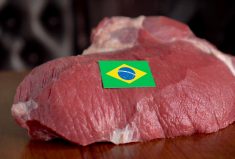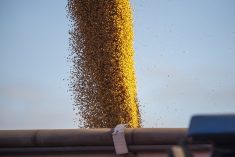Sao Paulo | Reuters — Brazilian soybean growers have asked their country to file a complaint against the U.S. at the World Trade Organization, alleging U.S. farm subsidies give an unfair advantage to the world’s top soybean producer.
Brasilia-based farm group Aprosoja says those subsidies might be costing Brazilian farmers $1 billion a year in lost business, according to Endrigo Dalcin, president of the association’s local branch in Mato Grosso, the nation’s top soy-growing state (all figures US$).
“Data is being analyzed to see if it is viable for us to question this American protectionism,” Dalcin said. Aprosoja has hired lawyers from Chicago-based law firm Sidley Austin LLC in Geneva, where the WTO is based, he added.
Read Also

U.S. grains: Soy futures post biggest monthly gain in nearly five years on China trade optimism
U.S. soybean futures climbed to a 15-month high and posted their biggest monthly gain in nearly five years on Friday following a rally fueled by the prospect of revived exports to China.
A spokesman at Brazil’s foreign ministry confirmed the farmers had made the request but warned the proposal needed review by several ministries and that the government would take at least a month to make a decision.
If opened, a WTO dispute could strain relations between the Western Hemisphere’s two largest countries after they grew closer last year.
Relations hit a low point in 2013 when Brazilian President Dilma Rousseff canceled a U.S. visit over an National Security Agency eavesdropping incident. But she traveled to Washington last June, and the two agricultural superpowers reached a deal for Brazil to export fresh beef to the U.S.
Soy farmers are following Brazilian cotton producers, who won $300 million in compensation from the U.S. in 2014 to settle a decade-old trade dispute over subsidies.
Brazil will probably overtake the U.S. as the world’s top soybean producer in coming years as it increases planting of the crop each season. It is already the world’s top exporter.
Brazilian officials told Reuters in April that the South American country had been gathering evidence that U.S. subsidies were pushing down already low prices for soy and corn .
A weakening currency against the dollar has since made Brazilian soybeans more competitive for export.
This season, Brazil is expected to harvest a record 100 million tonnes of soybeans, compared with 108.3 million tonnes from the U.S., according to the U.S. Department of Agriculture.
The soy harvest has gotten off to a late start in Mato Grosso. Only 0.3 per cent of the state’s soy acreage has been harvested, compared with 1.9 per cent a year earlier, after dry weather earlier in the season, farm institute IMEA said Friday.
— Caroline Stauffer is a Reuters correspondent based in Sao Paulo.












